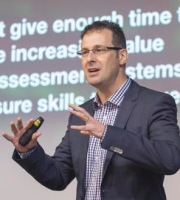
Last month Encylopedia Britannica announced that they would cease printing the venerable Encyclopaedia.
“For 244 years, the thick volumes of the Encyclopaedia Britannica have stood on the shelves of homes, libraries, and businesses everywhere … . Today we’ve announced that we will discontinue the 32-volume printed edition of the Encyclopaedia Britannica when our current inventory is gone”. (Source: Encyclopaedia Britannica Blog)
This month, they released an iPad/iPhone app. In the App Store, the Britannica app looks (deceptively) free, but once you download it, you discover that you really have to pay a $15/year subscription to use it. Otherwise you only see a sample of most articles.

Although I had been initially excited to think that I would have access to Encyclopaedia Britannica on my iPad, when confronted with a subscription price, I balked. The mere cost of a bistro chicken parmigiana, forced me to realise that my initial excitement was all about nostalgia and not at all because I had a practical need for the articles in Britannica.
Encyclopaedic knowledge was once scarce so $1500 seemed a fair price for it. Now, that kind of knowledge is ubiquitous and abundant and like any resource without scarcity, it has no economic value – not even $15. Britannica is trying to sell ice to eskimos.
The falling economic value of knowledge is a profound and permanent change in the fabric of society, and it doesn’t just have implications for traditional print media. It has implications for schools and teachers, too. If any teacher thinks that the value he brings to the classroom is knowledge, I’m afraid to say he is already becoming redundant.
Great teachers in this second decade, will need more than subject knowledge to have value. In the 20th Century, it was arguably the most important quality of a teacher. “She knows her stuff” was a common student endorsement of a quality teacher.
But “knowing your stuff” won’t be sufficient any more. Wikipedia knows it’s stuff, too. Better than you do, no doubt. The differentiator of success for a teacher will be the way you creatively translate knowledge to the lives of your students, the way you inspire them to discover knowledge themselves, and the way you infuse the learning process with joy.

As a teacher, my current favourite saying: “I don’t have all the answers, but golly I’m asking the right questions”. If my kids leave class with the same attitude, I figure they’ll be alright.
The one thing I don’t need to do is stuff their heads full of facts. ‘t they need facts, they can go ask Siri 😉
It is of course good to know facts – without having to consult Siri lol … but if we are spending all our time memorising facts, the opportunity cost we are paying is time for higher-order thinking skills. Sometimes good is the enemy of excellent.